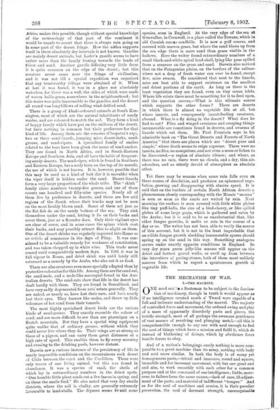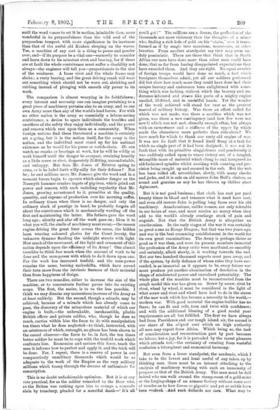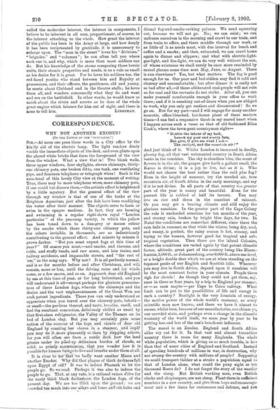O NE need not 10 a Scotsman to be subject to
the fascina- tion of machinery, though in truth it would appear as if no intelligence created south o' Tweed were capable of a full and intimate understanding of the marvel. The majesty of controlled force and movement, the ordered swing and play of a mass of apparently disorderly parts and pieces, the terrific strength, most of all perhaps the awesome gentleness of vast masses of revolving and plunging metc.1,—all this is comprehensible enough to any one with soul enough to feel the soul of things which have a mission and fulfil it, which do instead of blathering of doings, which by obedience force hostile forces to obey.
And of a nation's belongings surely nothing is more com- parable to a great machine than its army, nothing with body and soul more similar. In both the body is of many yet homogeneous parts,-;—trivial and immense, round and square,. immobile and for incessant movement, with but one great end and aim, to work smoothly with each other for a common purpose and at the command of one intelligence; liable, more- over, to failure from the same causes,—lack of care, ill-adjust- ment of the parts, and material of indifferent "temper." And as for the soul of machines and armies, it is their peouliar possession, the 'soul of dormant strength, unrecognisiblt until the word comes to set it in motion, inimitable then, more wonderful in its purposefulness than the wild soul of the purposeless tempest, with more significance in its inertness than that of the awful old Kraken sleeping on the waves. Yee, a machine of any sort is a thing to pause and ponder over, and—if its purpose be a vital one—earnestly to consider and learn down to its minutest rivet and bearing, for if these are at fault the whole contrivance must suffer a disability not always—the engineer will tell you—proportionate to the size of the weakness. A loose rivet and the whole frame may shake ; a rusty bearing, and the great driving crank will wear out something which should not be worn out, shrieking and rubbing instead of plunging with smooth oily power to its work.
The comparison is almost wearying in its faithfulness ; every interest and necessity one can imagine pertaining to a great piece of machinery pertains also to an army, and to our own Army more than any of the world's land forces. For with no other nation is the army so essentially a labour-saving contrivance, a device to spare individuals the troubles and sacrifices of the safety they enjoy individually, and the power and renown which rest upon them as a community. When foreign nations find these threatened a machine is certainly set a-going, but • it is the nation itself, for the army is the nation, and the individual must stand up for his national existence as he would for his purse or watch-chain. He can watch no cranks or bearings at work, for he will be wildly at work himself until the danger be overpast, straining humbly as a little screw or rivet, desperately ill-fitting, uncomfortable, and unhappy. But does Mr. Jones of Brixton spring to arms, or is he haled forth willy-nilly for their defence ? Not he ; he and millions more Mr. Joneses give the word and in a moment forces begin to operate which shatter danger as the Na.smyth hammer crushes ingots of pig-iron, which grind out power and renown with such unfailing regularity that Mr. Jones, growing accustomed to it, grumbles at the quality, quantity, and expense of production over his morning coffee. In ordinary times when there is no danger, and only the ordinary stock of prestige in hand, be probably forgets all about the contrivance which is mechanically warding off the first and maintaining the latter. His fathers gave the word long ago ; silently and afar off the work goes on; liken it to what you will, the simile of machinery must recui,—the unseen engine driving the great liner across the ocean, the .hidden loom weaving coloured glories for the Court beauty, the unknown dynamo flooding the midnight streets with light. How much of the movement, of the light and ornament of this nation depends upon the efficiency of its Army ! One almost trembles to think how much when the amount of work to be done and the man-power with which to do it dawn upon one. For the work has increased tenfold, and the man-power remains the same, barring makeshifts, which have served their turn more from the intrinsic fineness of their material than from happiness of design.
There are two remedies, either to increase the size of the machine, or to concentrate further power into its existing scope. The first, the easier, is to us the less possible. I think we may dismiss any momentous increase of the Army as at least unlikely. But the second, though a miracle, may be achieved, because of a miracle which has already come to pass, the discovery of the miraculous material of which our engine is built,—the unbreakable, inexhaustible, pliable British officer and private soldier, who, though he does so much, carries within him the force to do with manipulation ten times what be does neglected—to think, instructed, with an astuteness of which, untaught, no gleam has been shown to the casual observer—the force to be, in fact, the ten times better soldier he must be to cope with the tenfold work which confronts him. Economise and mature this force, teach the men it informs how to perfect and apply it, and the trick will be done. For, I repeat, there is a reserve of power in our comparatively nnmilitary thousands which would be as adequate to the work of the Empire as the very military millions which tramp through the dreams of enthusiasts for conscription.
This is no doubt unfashionable optimism. But it is at any rate practical, for as the soldier remarked to the Boer who, as the Briton was rushing upon him to avenge a comrade slain by treachery, pleaded for a merciful death—" It's all you'll get !" The millions are a dream, the perfection of the thousands not more visionary than the thoughts of a miner who, finding a rich lode of. gold on his " elaiiu, sees it trans- formed as if by magic into mansions, motor-cars, or other luxuries. From another standpoint my view may seem un- duly pessimistic. There are those that think that in South Africa our men have done more than other men could have done, that so far from having disappointed expectations they have exceeded them. And they are right. No equal number of foreign troops would have done so much, a fact which foreigners themselves admit, yet all our soldiers performed did but show how much more they could have done had their unique bravery and endurance been enlightened with some- thing which was lacking, without which the bravery and en- durance laboured and strove like parts of a mighty engine unoiled, ill-fitted, and in unskilful hands. Yet the wonder of the work achieved will stand for over as the greatest . marvel of military history. Was there an effort called for. which was not made, was there a sacrifice which was not given, was there a new contingency (and how few were not new?) which was not met, clumsily enough often, but always with an earnestness and a stiffness of the upper lip which made the clumsiness more pathetic than ridiculous ? We have much for which to thank our rusty old engine of war. It was not its fault that it found itself flung at a task for which no single part of it had been designed ; it was not its fault that with its primitive sluggishness and ponderosity it. was suddenly called upon to weave victory out of a tangled, intangible maze of material which clung to and hampered its old-fashioned spindles whilst avoiding with cunning and pre- cision being caught up and secured in the web. But the web has been rolled off, nevertheless, slowly, with many checks and jerks, and it is safe on old mercer John Bull's shelves, as sound and genuine as any he has thrown up thither since Agincourt.
But it is not good business ; that cloth has cost per yard twenty times in blood and treasure what it need have cost, and even old mercer John is pulling long faces over his old- machinery. Anachronisms, unlike women, are only tolerable' in our hours of ease, and must receive no mercy when they add to the world's already overlarge stock of pain and anguish. Not that the British Army is altogether an anachronism. In the early stages of the war it was certainly as great a one as Rouge Dragon; but that was two years ago, and war is the best cramming establishment in the world for its own great examinations. The Army is perhaps thrice as. good as it was then, and were its present members immortal the profession of the Army critic were moribund, so smoothly and certainly, albeit slowly, is it working towards the end. But our two hundred thousand experts must pass away, and if the system, by daily defiance of whose rules they have suc- ceeded, is as immortal as it appears to be, every future war must produce yet another abomination of desolation in the shape of misdirected power and unrealised potentiality. The whole plan of the machine must be reconstructed from the rough model this war has given us. Screw by screw, rivet by rivet, wheel by wheel, it must be considered in the light of what screw and rivet and wheel have had to do in the stress of the new work which has become a necessity in the world,— modern war. With good material the engine-builder has no fears; he can fit and refit, turn and twist with confidence; and with the additional blessing of a good model your requirements are all but fulfilled. The first we have always had from Providence and our rough island air, the second is our share of the aliquid nova: which on high authority all men may expect from Africa. Which being so, the task of consideration and reconstruction part by part becomes no labour, but a joy, for it is pervaded by the rarest pleasure which attends toil,—the certainty of creating from wasteful confusion a triumphant and economical harmony.
But even from a lower standpoint, the academic, which I take to be the lowest and least useful of any taken up by thinking man, there must be an interest attaching to the analysis of machinery working with such an immensity of purpose as that of the British Army. The man must be dull indeed who can walk around the stamp-room of a gold-mine or the forging-shops of an armour factory without some sort of wonderias_to. how forces so gigantic and yet so subtle have been evoLvedt. E-lititti such dullards are rare. What may be called the molecular interest, the interest in components, I believe to be inherent in all men, proportionate, of course, to the interest attaching to the whole. How great the interest of the public has been in the Army at large, and how deeply it has been reciprocated by gratitude, it is unnecessary to enlarge upon. The "man in the street" loves his "divisions," "brigades," and " columns " ; he can often tell you where each one is, and why, which is more than most soldiers can do. But his knowledge of the atoms composing those heroic units, their atomic properties and needs, is as a rule as small as his desire for it is great. For he loves his soldiers too, the red-faced youths who stand between him and Royalty at processions, and their officers, the gentlemen, old and young, he meets about Clubla.nd and in the theatre stalls; he loves them all, and wonders consumedly what they do and want and are on the battlefield. In other words, he would know as much about the rivets and screws as he does of the whole great engine which labours for him out of sight, and there is












































 Previous page
Previous page